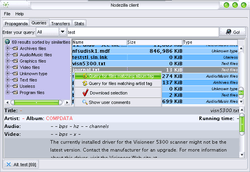Nodezilla
Nodezilla is a peer-to-peer network software written in C++ (core, aka Network Agent) and Java (GUI), and the GUI part is released under the GNU General Public License. It attempts to provide anonymity.
 Screenshot of Nodezilla Client | |
| Developer(s) | Nodezilla developers |
|---|---|
| Initial release | 2004 |
| Stable release | 0.5.15
/ January 29, 2010 |
| Operating system | Linux x86, Windows 2000/2003/XP/Vista, Nodezilla Java Client. |
| Available in | C++ |
| Type | File sharing |
| License | GUI in GPL, core is closed source |
| Website | www |
Features
Technically, Nodezilla is a secured, distributed and fault-tolerant routing system (aka Grid network). Its main purpose is to serve as a link for distributed services built on top of it (like chat, efficient video multicasting streaming, file sharing, secured file store ...).[1][2]
Nodezilla provides cache features; any server may create a local replica of any data object. These local replicas provide faster access and robustness to network partitions. They also reduce network congestion by localizing access traffic. It is assumed that any server in the infrastructure may crash, leak information, or become compromised, therefore in order to ensure data protection, redundancy and TLS encryption are used. As the developers have not published the source code of the Network Agent yet, no independent validation of the provided level of anonymity has been performed.
It currently offers three services:
- Anonymous file sharing
- Hierarchical multimedia streaming
- Digital photo sharing with selected friends.
The project also offers a plugin for Vuze, the popular BitTorrent Client, enabling users to publish and distribute .torrent files without index nor tracker web pages.
See also
References
- "Nodezilla". Grid networking. 2005-02-15. Archived from the original on 2005-02-15. Retrieved 2020-05-21.CS1 maint: unfit url (link)
- "Nodezilla – What is it ?". nodezilla.net. 2005-02-15. Archived from the original on 2005-02-15. Retrieved 2020-05-21.CS1 maint: unfit url (link)